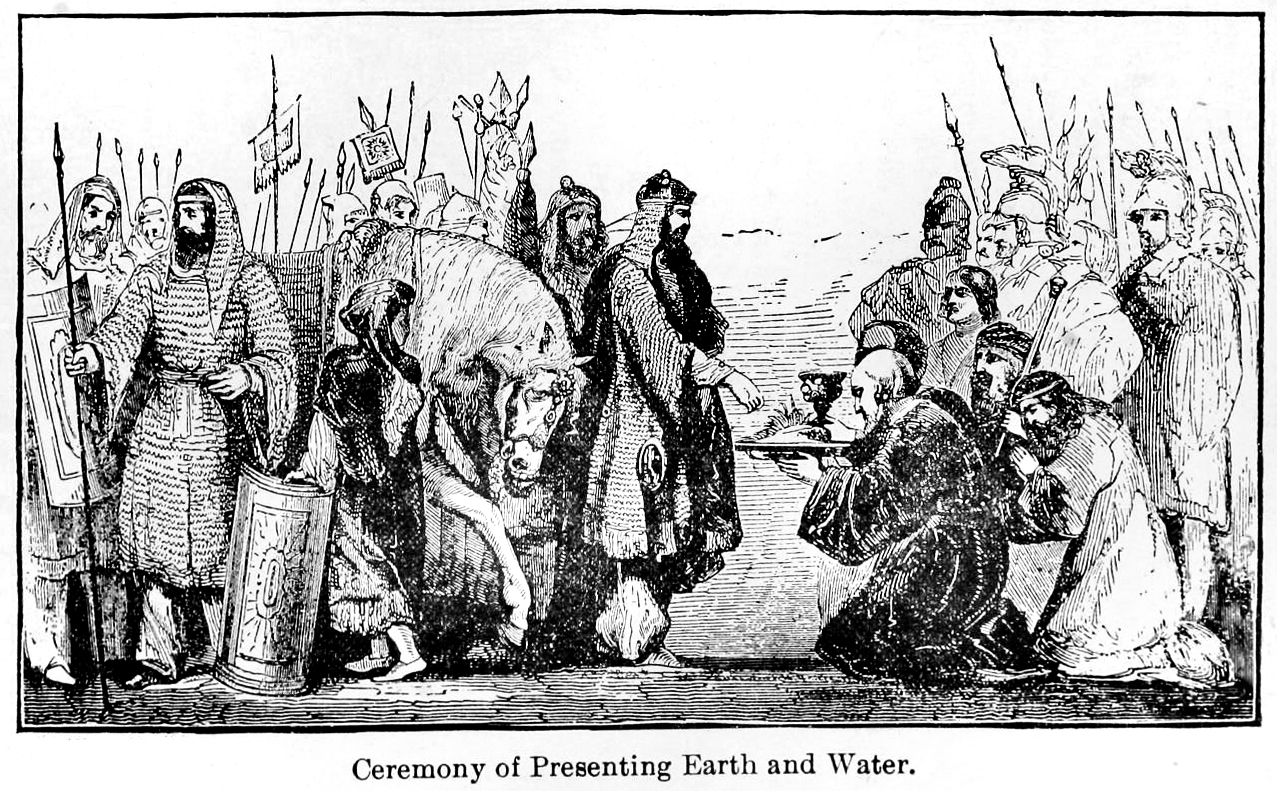Earth And Water on:
[Wikipedia]
[Google]
[Amazon]

 "Earth and water" (; ) is a phrase that represents the demand by the
"Earth and water" (; ) is a phrase that represents the demand by the
Livius.org: Earth and water
{{Webarchive, url=https://web.archive.org/web/20140306003738/http://www.livius.org/ea-eh/earth/earthandwater.html , date=2014-03-06 Greco-Persian Wars Greek words and phrases Achaemenid Empire

 "Earth and water" (; ) is a phrase that represents the demand by the
"Earth and water" (; ) is a phrase that represents the demand by the Achaemenid Empire
The Achaemenid Empire or Achaemenian Empire, also known as the Persian Empire or First Persian Empire (; , , ), was an Iranian peoples, Iranian empire founded by Cyrus the Great of the Achaemenid dynasty in 550 BC. Based in modern-day Iran, i ...
for formal tribute from surrendered cities and nations. It appears in the writings of the Greek historian and geographer Herodotus
Herodotus (; BC) was a Greek historian and geographer from the Greek city of Halicarnassus (now Bodrum, Turkey), under Persian control in the 5th century BC, and a later citizen of Thurii in modern Calabria, Italy. He wrote the '' Histori ...
, particularly with regard to the Greco-Persian Wars
The Greco-Persian Wars (also often called the Persian Wars) were a series of conflicts between the Achaemenid Empire and Polis, Greek city-states that started in 499 BC and lasted until 449 BC. The collision between the fractious political world ...
.
Usage by Herodotus
In Book 4, Herodotus mentions for the first time the term ''earth and water'' in the answer of king Idanthyrsus of theScythians
The Scythians ( or ) or Scyths (, but note Scytho- () in composition) and sometimes also referred to as the Pontic Scythians, were an Ancient Iranian peoples, ancient Eastern Iranian languages, Eastern Iranian peoples, Iranian Eurasian noma ...
to king Darius. In Book 5, it is reported that Darius sent heralds demanding ''earth and water'' from king Amyntas I of Macedon
Macedonia ( ; , ), also called Macedon ( ), was an ancient kingdom on the periphery of Archaic and Classical Greece, which later became the dominant state of Hellenistic Greece. The kingdom was founded and initially ruled by the royal ...
, which he accepted. It was also requested of the Athenian embassy to Artaphernes
Artaphernes (Greek language, Greek: Ἀρταφέρνης, Old Persian language, Old Persian: Artafarna, from Median language, Median ''Rtafarnah''), was influential circa 513–492 BC and was a brother of the Achaemenid king of Persia, Darius I. ...
in 507 BC, which complied. In the 6th book, Darius sent heralds throughout Greece
Greece, officially the Hellenic Republic, is a country in Southeast Europe. Located on the southern tip of the Balkan peninsula, it shares land borders with Albania to the northwest, North Macedonia and Bulgaria to the north, and Turkey to th ...
demanding ''earth and water'' for the king (Hdt. 6.48). There were not many city-states that refused.
In Book 7, he recounts that when the Persians
Persians ( ), or the Persian people (), are an Iranian ethnic group from West Asia that came from an earlier group called the Proto-Iranians, which likely split from the Indo-Iranians in 1800 BCE from either Afghanistan or Central Asia. They ...
sent envoys to the Spartans and to the Athenians demanding the traditional symbol of surrender, an offering of soil and water, the Spartans threw them into a well and the Athenians threw them into a gorge, suggesting that upon their arrival at the bottom, they could "Dig it out for yourselves."
Just before the second Persian invasion of Greece by Xerxes, the Spartans voluntarily sent two men of noble birth to Susa for execution, in atonement for the death of the Darius' heralds. This did not satisfy Xerxes who punished the Greeks by defeating the Spartan Army and destroying Athens.
Interpretation
The demand for ''earth and water'' symbolized that those surrendering to Persians gave up all their rights over their land and every product of the land. Giving ''earth and water'', they recognized the Persian authority over everything; even their lives belonged to the king of Persians. Then negotiations would take place to specify the obligations and the benefits of the liegemen. The phrase ''earth and water'', even in modernGreek
Greek may refer to:
Anything of, from, or related to Greece, a country in Southern Europe:
*Greeks, an ethnic group
*Greek language, a branch of the Indo-European language family
**Proto-Greek language, the assumed last common ancestor of all kno ...
, symbolizes unconditional subordination to a conqueror.
According to the modern historian J. M. Balcer, the significance of earth and water is that they were Zoroastrian
Zoroastrianism ( ), also called Mazdayasnā () or Beh-dīn (), is an Iranian religion centred on the Avesta and the teachings of Zarathushtra Spitama, who is more commonly referred to by the Greek translation, Zoroaster ( ). Among the wo ...
symbols and representative of vassalage to the Persian Empire. "Persian heralds traveled throughout Greece demanding the recognition of Persian Suzerainty and the Zoroastrian symbols of earth and water, the marks of vassalage...".
However, according to a new analysis by Daniel Beckman, the ritual of "earth and water" originated from a Neo-Assyrian practice that represented the violent conquest of a city, while in the Achaemenid Empire it symbolized peaceful, voluntary submission.
See also
* '' Come and take them'', a Greek phrase attributed to the Spartan response to the Persian demand that they surrender their weaponsReferences
Further reading
*External links
Livius.org: Earth and water
{{Webarchive, url=https://web.archive.org/web/20140306003738/http://www.livius.org/ea-eh/earth/earthandwater.html , date=2014-03-06 Greco-Persian Wars Greek words and phrases Achaemenid Empire